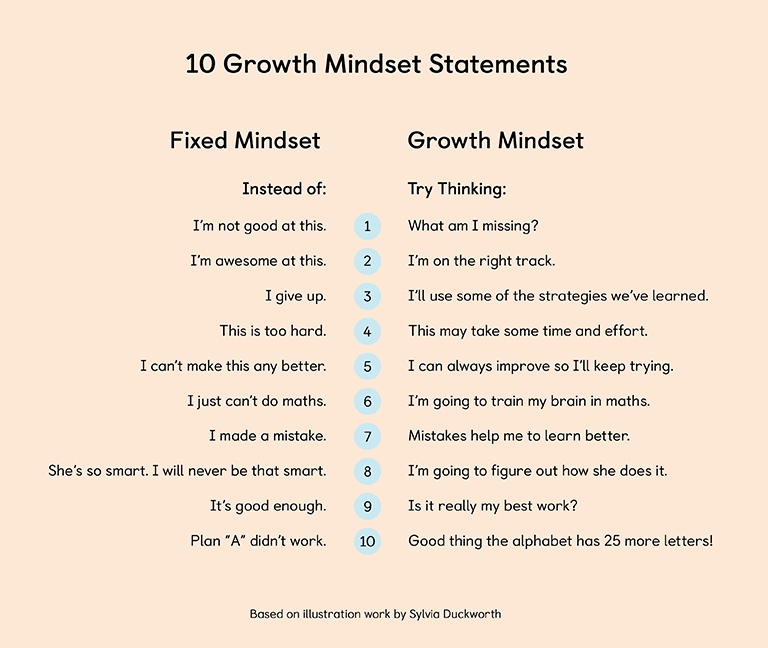How a growth mindset helps facilitate learning in maths
Editor’s Note:
This is an updated version of a blog post published on August 28, 2018.
The right kind of environment can transform pupils’ attitudes towards learning maths. And in the process, help pupils develop a ‘growth mindset’.
Recently, in a Year 2 PE lesson I paired confident skippers with less confident skippers, asking the former to coach the latter. Most pairs got on well, with some less-confident skippers articulating how much they appreciated their partner’s help.
One pupil however couldn’t accept advice from his partner. He was in tears, floored by the fact that his partner was more expert at skipping than him and unable to listen to what his ‘coach’ may have to offer to help him learn to skip better.
Carol Dweck and the growth mindset
This closed attitude contrasts with some of the findings of Carol Dweck’s research from the 1970s. She looked at the attitudes of 10-year-olds when faced with increasingly difficult puzzles, and discovered that the children relished trying things out. They weren’t discouraged by failure. In fact, they didn’t see it as failure at all, they saw it as an opportunity to learn.
These contrasting attitudes have been coined by Dweck as a “fixed” and “growth” mindset. The latter is based on the belief that everyone can change and grow through application and experience. Intelligence isn’t a completely fixed quality, it can be cultivated.
Dweck’s psychological insights are reinforced by recent advances in neuroscience which show that the brain is far more malleable than previously thought. It’s possible to strengthen neural pathways by using good learning strategies, asking questions and practicing.
A growth mindset through playful learning
Maths — No Problem! takes a playful approach to learning. Explorative anchor tasks, experimentation with concrete materials and time for collaborative conversation with peers means that a growth mindset is integrated into the lessons.
For teachers, this approach to learning is all about creating a classroom environment where pupils feel safe to explore and discover, take risks and learn through trial and error. For pupils, it means that maths is not a memory exercise, it requires thinking, figuring things out and negotiating meaning for themselves.

When we create this kind of learning environment, we draw on pupils’ natural curiosity and spirit of enquiry which, in turn, creates a positive experience and attitude towards maths itself.
Transform Your Maths Assessment
Insights — our online assessment tool — gives you instant, powerful data to identify gaps and improve results.

Do you have a growth mindset?
As teachers, we can’t think about a growth mindset in our classrooms without asking ourselves some hard questions about our own attitudes to growth. Our own mindset can affect our responses to pupils and impact their outcomes.
We can probably all identify areas of our lives where we’re fixed, where we have a learned sense of helplessness or aren’t willing to venture out of our comfort zone to try something that doesn’t come easily to us.
In other areas, we might be more open to trying new things, venturing beyond what we already know. In these cases we expect that mistakes and perseverance will be part of the process — but we also feel that the struggle will be worth it.
If we have a fixed mindset we can also identify whether we see intelligence as a fixed quality which can’t be cultivated. We might be easily demotivated and discouraged by failure, or have a need to prove how smart or talented we are to validate ourselves and see success as getting everything right the first time.
In contrast, if we’re prepared to stretch ourselves to learn something new, to see our qualities as areas that can be developed and changed, to have a sense of becoming rather than being an accomplished expert already and to thrive on challenge then we’ll know we have a growth mindset.
Take some time to reflect on this.
What areas of your life spring to mind that you would identify as open to development (growth mindset) and others as closed to change (fixed mindset)?
How does this affect the classroom environment you create? Where would you like to be more open to a Growth Mindset?
The impact on pupils
One of the positive impacts of using Maths — No Problem! is that a relational, growth mindset approach helps teachers develop a greater flair and confidence in maths, moving us away from a fixed mindset. This lets us create a freer learning environment where our pupils are encouraged to take risks.
Dweck’s work shows many other benefits to having a growth mindset. It enables pupils to persist for longer with problem-solving, cope better with transitions, enjoy challenges more, improve self-esteem, develop a learning orientation and even increase their wellbeing. To find out more, read her book ‘Mindset: How You Can Fulfil Your Potential’ (2012) or watch her on YouTube.
Loving this conceptual stretch can sometimes be a challenge. But when we’re intrigued by mistakes, enjoy the effort and keep on learning, our pupils are more likely to as well.
